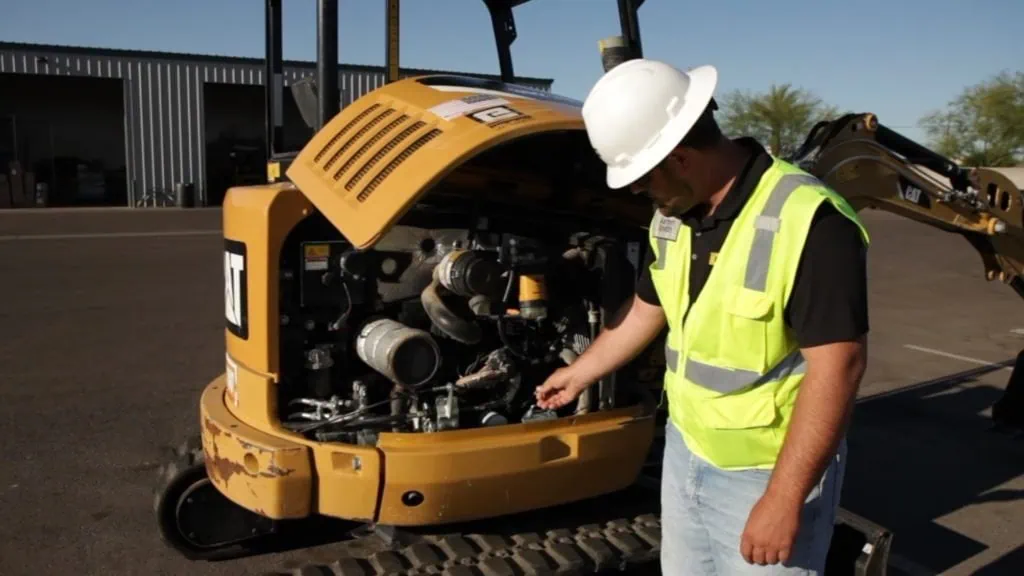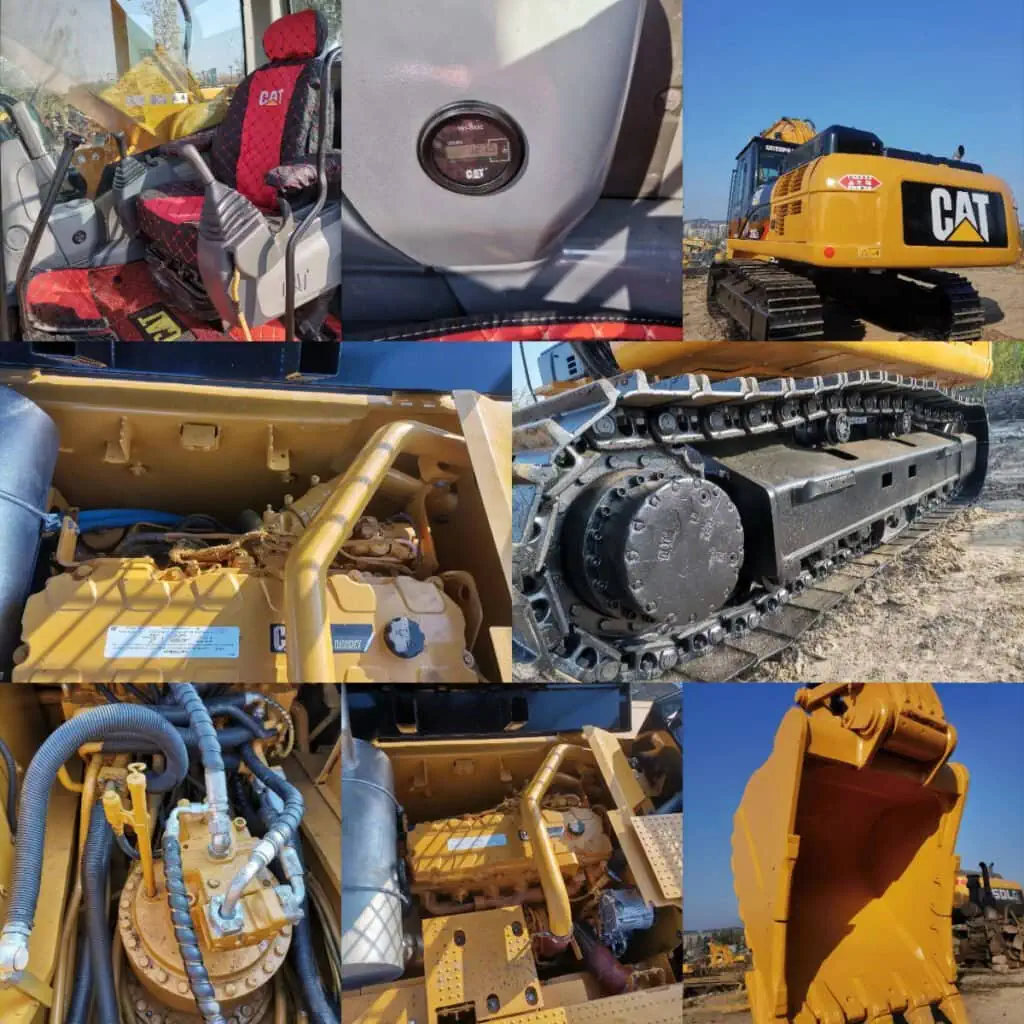Whether you’re in construction, landscaping, or mining, if you own and operate an excavator, you must keep it in top condition. Proper excavator service is not just about keeping your machine running, it’s about protecting your investment and avoiding costly downtime. Excavators are heavy-duty machines that work under harsh conditions. For this reason, they require routine excavator maintenance to stay efficient and productive on the job. In this guide,
We’ll look at the following: Key aspects of excavator maintenance The importance of a proper excavator maintenance schedule How to keep your excavator service costs under control

Why Excavator Service is Crucial
Excavators are designed to handle tough jobs, but without routine excavator service, these machines can suffer from a range of issues that affect performance. Lack of maintenance leads to breakdowns, and a breakdown on a job site means downtime—a costly and disruptive issue for any operation. By adhering to a regular excavator maintenance schedule, you ensure that small issues are caught before they become big, expensive problems. Preventive maintenance can save you both time and money in the long run.
Without proper service, excavators are vulnerable to wear and tear in critical parts such as the engine, hydraulic system, and undercarriage. Regular maintenance checks help avoid costly excavator repair work and extend the lifespan of your machine. Furthermore, a well-maintained excavator has improved fuel efficiency, better productivity, and a higher resale value.

Key Components of an Excavator Maintenance Schedule
A solid excavator maintenance schedule is the backbone of proper equipment care. This schedule should include daily, weekly, monthly, and annual checks, ensuring that the machine runs smoothly.
Daily Checks:
- Oil Levels and Fluids: Check the engine oil, hydraulic oil, coolant, and other essential fluids to ensure proper levels.
- Hydraulic Systems: Inspect the hydraulic hoses and cylinders for leaks or signs of wear. Low fluid levels can affect machine performance.
- Filters and Vents: Clean or replace air and fuel filters as needed to maintain optimal airflow and prevent clogging.
- Track and Undercarriage: Inspect the tracks for tension and wear. Ensure that the undercarriage is clean and free from debris that could cause damage.
Weekly Checks:
- Greasing: Lubricate the pins and bushings in the boom, arm, and bucket to reduce friction and prevent wear.
- Battery Terminals: Ensure the battery terminals are clean and tight to avoid power issues.
Monthly Checks:
- Hydraulic Oil Condition: Test the hydraulic oil for contamination and change it if necessary.
- Tracks and Idlers: Check for wear on the tracks and idlers. Proper tension is essential for optimal performance and longevity.
- Engine and Cooling Systems: Clean the radiator and inspect the fan belts. Overheating can lead to engine failure.
Annual Checks:
- Transmission and Differential: Perform a thorough inspection of the transmission and differential systems for wear and tear.
- Under Carriage: A full inspection of the undercarriage should be done annually, looking for any signs of damage or excessive wear.
- Excavator Service Checklist: Review all maintenance logs and ensure all services are up-to-date.
| Maintenance Frequency | Maintenance Task |
|---|---|
| Daily Checks | Oil Levels and Fluids |
| Hydraulic Systems | |
| Filters and Vents | |
| Track and Undercarriage | |
| Weekly Checks | Greasing |
| Battery Terminals | |
| Monthly Checks | Hydraulic Oil Condition |
| Tracks and Idlers | |
| Engine and Cooling Systems | |
| Annual Checks | Transmission and Differential |
| Under Carriage | |
| Excavator Service Checklist |
Excavator Service Checklist: Key Maintenance Tasks
A comprehensive excavator service checklist ensures that every part of your excavator is inspected and maintained. Here’s a breakdown of the critical maintenance tasks:
| Maintenance Task | Details | Frequency |
|---|---|---|
| Oil and Fluid Checks | Check engine oil, hydraulic fluid, and coolant levels | Daily |
| Greasing and Lubrication | Grease pins, bushings, and joints; lubricate tracks and undercarriage | Weekly or Monthly |
| Hydraulic System Maintenance | Inspect hoses, pumps, and cylinders for leaks; replace damaged parts | Monthly |
| Air and Fuel Filter Replacement | Clean or replace blocked filters | Every 250 hours or as needed |
| Track Maintenance | Examine tracks for damage, wear, or misalignment; adjust tension | Every 500 hours |
| Visual Inspections | Inspect boom, arm, bucket, and chassis for potential issues | Daily or Weekly |
| Battery Care | Clean terminals, check charge | Monthly |

Excavator Service Cost Breakdown
Understanding excavator service costs is essential for budgeting and planning maintenance activities. The cost of excavator maintenance varies depending on the type of excavator, its age, usage, and the frequency of maintenance required.
Routine Maintenance Costs: Regular maintenance, such as oil changes, lubrication, and filter replacements, typically costs less and is scheduled more frequently. These tasks usually fall within a range of $200–$500, depending on the machine’s size and the complexity of the service.
Repairs: If your excavator requires more extensive repairs, such as hydraulic system fixes or undercarriage replacements, the costs can range from $1,000 to several thousand dollars, depending on the issue’s severity.
Maintenance Service Contracts: Many companies offer service contracts that cover all regular maintenance tasks, which can help reduce excavator service costs over time. These contracts often include a predetermined schedule for checks and repairs, as well as parts and labor for a flat fee.
Excavator Service Sheet: Keeping an excavator service sheet is crucial for tracking maintenance and repair history. It helps to ensure that all required tasks are performed on time and also increases the resale value of your machine.
When to Call for Excavator Repair
While preventive maintenance is crucial, there are times when even the best-maintained excavators will need more significant repairs. Knowing when to call for excavator repair is important to avoid further damage to your machine.
Here are some common signs that indicate your excavator needs professional repair:
- Unusual Noises: Grinding, squeaking, or rattling sounds from the engine or hydraulic system.
- Leaks: Hydraulic fluid, oil, or coolant leaks are indicators of potential damage to the system.
- Loss of Power: If the excavator struggles to lift heavy loads or moves slowly, there could be issues with the hydraulic system or engine.
- Track Damage: Excessive wear, missing links, or damage to the tracks can affect the stability of the machine and may require repairs.
- Warning Lights: Pay attention to any warning lights or error codes on the excavator’s dashboard. These could signal underlying mechanical issues.
Conclusion
In conclusion, regular excavator service and maintenance are essential to keeping your equipment running efficiently and preventing costly repairs. By following a detailed excavator maintenance schedule and using an excavator service checklist, you can avoid many common issues that lead to unexpected downtime and repairs. Be proactive with your machine’s upkeep, and don’t hesitate to seek professional assistance when repairs are necessary. A well-maintained excavator will offer better performance, increased productivity, and a longer service life, making it a sound investment for your business. Remember that excavator service costs are an investment in the long-term health of your machinery. With a solid maintenance plan in place, you’ll keep your excavator in top condition and ready to tackle any job.






